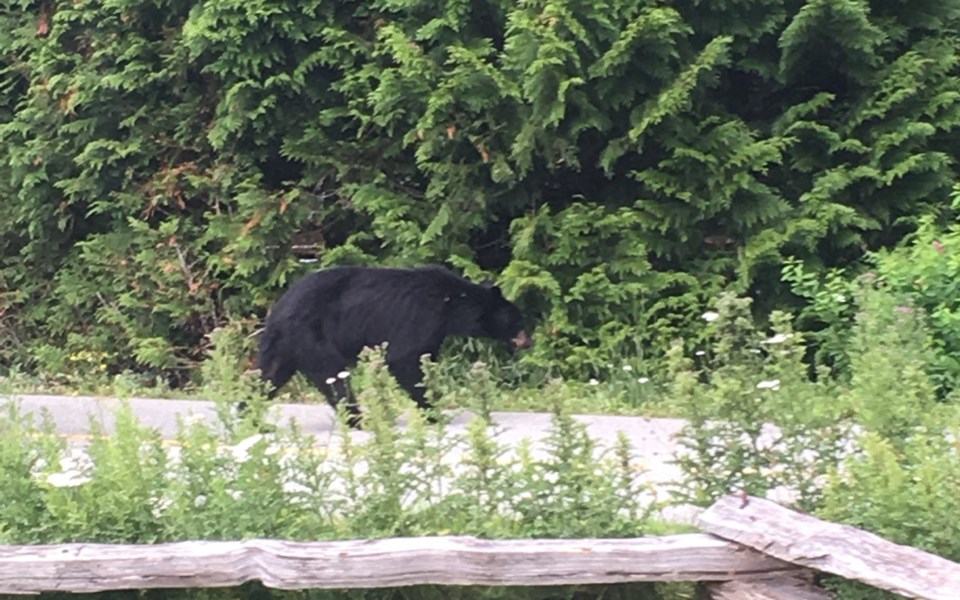With bear activity on the rise in Whistler—bears have killed two dogs and seriously injured another so far in 2019—the public is being reminded to stay vigilant.
According to the Conservation Officer Service (COS), more than 50 per cent of negative encounters between the public and bears involve dogs.
"In Whistler we do have a bylaw, you're supposed to have your dog on-leash," said Sgt. Simon Gravel with the COS.
"We see too many people still with their dog at large, so we hope to let the public understand the possible consequence of that and take responsible action and keep their dog on-leash."
While Gravel confirmed two dogs were killed by bears this year, he couldn't provide more information before press time.
From 2016 to 2018 there were 19 reports of dogs chasing bears in Whistler, according to stats from the COS.
In 2016, a sow and two cubs of the year were destroyed after numerous reports of the sow charging people with dogs off-leash.
Under the Wildlife Act, an individual can be charged for letting their dog chase a bear.
Bears are incredibly intelligent, and remember both good and bad experiences, said Ellie Lamb of the Get Bear Smart Society.
"If a mom bear has a history in an area where dogs have unfairly chased and harassed both her and her cubs she will simply come to dislike dogs. There have been many times where a dog has harassed a bear and brought the fearful bear back to the human, and death or injury followed," Lamb wrote in an email.
"We cannot have untrained dogs chase and harass bears or the bears will at times fight back. Not only is it cruel and unfair to a bear, but it can create problems where there didn't need to be [any].
"If we are to be kind to both our dogs and the bears in an area, the onus is on us to leash our dogs during the bear season. Otherwise either the dog, the owner and most assuredly the bear are at risk of being unnecessarily injured or even killed."
Many of the recent reports to the COS have involved bears traversing the Valley Trail, Gravel said.
"There's been a lot of encounters, but nothing aggressive, no major issues," he said.
"But people need to be aware that if they use the Valley Trail to try to make some noise and not travel alone, maybe, at night, and make sure when you go to a tight corner to make a bit of noise to inform the bears of your presence.
"That would be a good, proactive way to avoid a surprise encounter."
The warm weather means people need to take extra caution, Gravel added.
Those lounging at Whistler's lakes need to secure any attractants before they hit the water, and open doors and windows at home should be monitored.
"It doesn't take long for a bear to access a house, and that's definitely a very hazardous situation," Gravel said.
"So we're asking the residents to be very, very diligent with open access to their houses."
The COS has procured a capture net to assist with relocations (in October of last year, a sow died in a fall from a tree after being tranquilized, prompting outrage from the community).
"We did some training and practiced with it. We didn't use it in a real scenario yet, but it's in Whistler ready to go if it's needed, and we'll use it when it makes sense to use it," Gravel said, adding that, while it's possible to deploy the net alone, it's quicker and easier with multiple officers.
"So in a situation that they will be needed, most likely we will either have two officers or we'll ask for assistance."
While Whistler is lucky to have one officer and another officer-in-training stationed locally, it's also a very busy time of year for the COS, Gravel noted.
"We also have a presence on the water making sure the people that are paddle boarding or boating have the proper safety equipment, and we also enforce the Fisheries Act and the Wildlife Act for angling-related issues," Gravel said.
"So right now it's very busy on the river in Squamish and the lakes in Whistler with the nice weather, so we have a presence there and we're making sure people follow regulations.
"But we do have three officers in Squamish and we obviously support the entire zone here, so we go where it's needed."
Report bears in residential areas by phoning 1-877-952-7277.
Find more at www.whistler.ca/bears.




